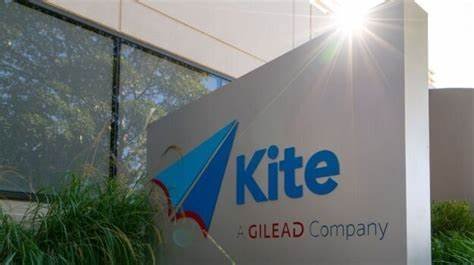Gilead and Kite Oncology Announce Approval of Yescarta® for Early Treatment of DLBCL in Singapore
10 June 2024 | Monday | News

Image Source : Public Domain
**-- In ZUMA-7, Yescarta Patients with DLBCL were 2.5 Times More Likely than SOC to be Alive at Two Years Without Cancer Progression or Need for Additional Treatments --
Gilead and Kite Oncology announced that the Health Sciences Authority (HSA) has approved Yescarta® (axicabtagene ciloleucel) for the treatment of adult patients with diffuse large B-cell lymphoma (DLBCL) and high-grade B-cell lymphoma (HGBL) that relapses within 12 months from completion of, or is refractory to, first-line chemoimmunotherapy. This approval is based on results from the pivotal Phase 3 ZUMA-7 study, the largest and longest trial of a Chimeric Antigen Receptor (CAR) T-cell therapy versus SOC in this patient population.
“The aggressive nature of DLBCL has presented an ongoing unmet treatment need for patients living with this blood cancer, as people who do not respond to, or fail after treatment, have a median overall survival of just six months,” said Dr. Lim Zi Yi, Senior Consultant in Haematology and Medical Director of Centre for Clinical Haematology, Singapore. “This approval is welcome news to the clinical community and marks an important step in bringing this innovative therapy earlier to more patients in Singapore.”
The ZUMA-7 study demonstrated that at a median follow-up of two years, Yescarta-treated patients had a four-fold greater improvement in the primary endpoint of event-free survival (EFS; hazard ratio 0.40; 95% CI: 0.31-0.51, P<0.001) over the current SOC (8.3 months vs 2.0 months). Additionally, Yescarta demonstrated a 2.5-fold increase in patients who were alive at two years without disease progression or need for additional cancer treatment vs SOC (41% vs 16%). Improvements in EFS with Yescarta were consistent across key patient subgroups, including elderly patients (HR: 0.28 [95% CI: 0.16-0.46]), primary refractory patients (HR: 0.43 [95% CI: 0.32-0.57]), high-grade B-cell lymphoma (HR: 0.28 [95% CI: 0.14-0.59]), and double-expressor lymphoma patients (HR: 0.42 [95% CI: 0.27-0.67]). Yescarta had a manageable safety profile that was consistent with previous studies.
“Today’s approval marks an important step towards that goal by providing patients in Singapore this option of CAR T-cell therapy earlier in their treatment journey,” said Diego Santoro, General Manager, Intercontinental Region, Kite. “For those facing the uncertainties and challenges of an aggressive lymphoma diagnosis in Singapore, this milestone offers the potential for survival and brings us one step closer to changing the way cancer is treated.”
The standard of care (SOC) to treat DLBCL patients has historically been a multi-step process that starts with chemoimmunotherapy, followed by high-dose chemotherapy (HDT), and then ends with a stem cell transplant (ASCT). Although approximately 60% of newly diagnosed LBCL patients will respond to the initial treatment with chemotherapy, 40% will relapse or will not respond and need second-line treatment
Most Read
- How Does GLP-1 Work?
- Innovations In Magnetic Resonance Imaging Introduced By United Imaging
- Management of Relapsed/Refractory Multiple Myeloma
- 2025 Drug Approvals, Decoded: What Every Biopharma Leader Needs to Know
- BioPharma Manufacturing Resilience: Lessons From Capacity Expansion and Supply Chain Resets from 2025
- APAC Biopharma Review 2025: Innovation, Investment, and Influence on the Global Stage
- Top 25 Biotech Innovations Redefining Health And Planet In 2025
- The New AI Gold Rush: Western Pharma’s Billion-Dollar Bet on Chinese Biotech
- Single-Use Systems Are Rewiring Biopharma Manufacturing
- The State of Biotech and Life Science Jobs in Asia Pacific – 2025
- Asia-Pacific Leads the Charge: Latest Global BioSupplier Technologies of 2025
- Invisible Threats, Visible Risks: How the Nitrosamine Crisis Reshaped Asia’s Pharmaceutical Quality Landscape
Bio Jobs
- Sanofi Turns The Page As Belén Garijo Steps In And Paul Hudson Steps Out
- Global Survey Reveals Nearly 40% of Employees Facing Fertility Challenges Consider Leaving Their Jobs
- BioMed X and AbbVie Begin Global Search for Bold Neuroscience Talent To Decode the Biology of Anhedonia
- Thermo Fisher Expands Bengaluru R&D Centre to Advance Antibody Innovation and Strengthen India’s Life Sciences Ecosystem
- Accord Plasma (Intas Group) Acquires Prothya Biosolutions to Expand Global Plasma Capabilities
- ACG Announces $200 Million Investment to Establish First U.S. Capsule Manufacturing Facility in Atlanta
- AstraZeneca Invests $4.5 Billion to Build Advanced Manufacturing Facility in Virginia, Expanding U.S. Medicine Production
News











